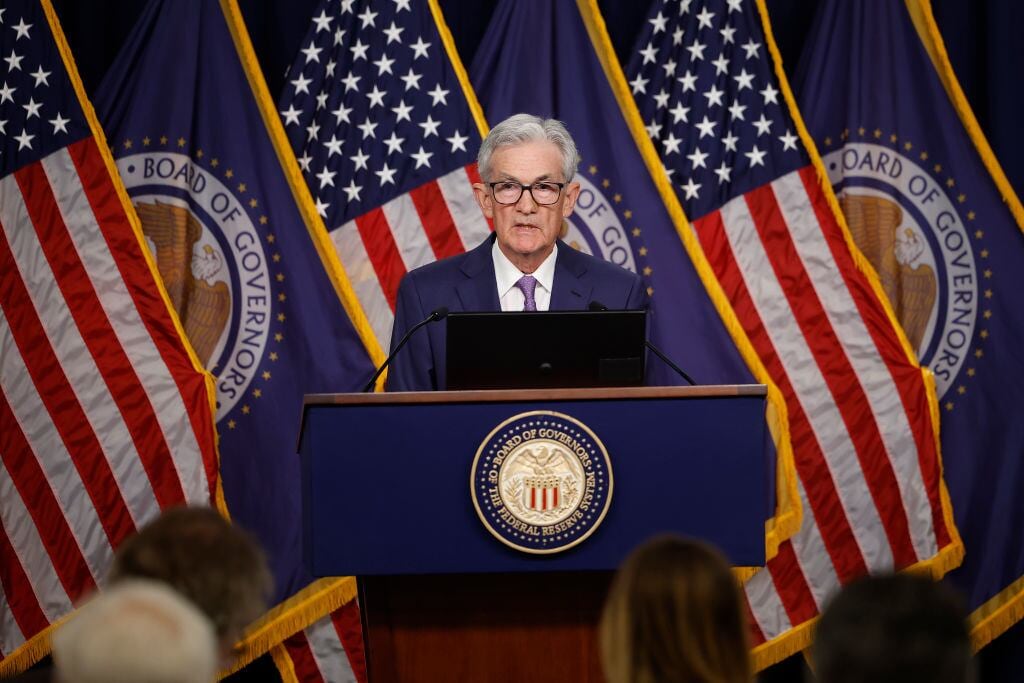By Damian J. Troise
Stocks capped another day of losses on Wall Street Friday with the worst weekly drop for the S&P 500 since the start of the pandemic.
Stocks have been falling amid concerns about rising inflation and the Federal Reserve's plan to raise interest rates from historic lows to try and curtail inflation. Low rates helped support the broader market as the economy absorbed a sharp hit from the pandemic in 2020 and then recovered over the last two years.
The S&P 500 fell 84.79 points, or 1.9%, to 4,397.94. The benchmark index has now slipped three weeks straight and the latest weekly loss is its worst since March of 2020.
The Dow Jones Industrial Average fell 450.02 points, or 1.3%, to 34,265.37 and also fell for its third straight week.
The tech-heavy Nasdaq fell 385.10, or 2.7%, to 13,768.92 and has been hit particularly hard by expectations for higher interest rates. As investors prepare for higher interest rates, shares in pricey tech companies and other expensive growth stocks look relatively less attractive. The index has fallen for four straight weeks and losses in recent months had by Wednesday left it in what Wall Street considers a market correction, or 10% below its peak.
The Nasdaq is now down 14.3% from its record high set on Nov. 19.
Technology stocks have been directing, and often abruptly redirecting, momentum in the market throughout the week.
“The market is working through digestion of how much monetary policy change will occur over the course of 2022,” said Bill Northey, senior investment director at U.S. Bank Wealth Management.
Technology and communications stocks were among the biggest drags on the market.
Streaming video service Netflix plunged 21.8% after it delivered another quarter of disappointing subscriber growth. Disney, which has also been trying to grow its subscriber base for its streaming service, fell 6.9%.
A mix of retailers, travel-related companies and other companies that rely on direct consumer spending also fell.
Bond yields fell significantly. The yield on the 10-year Treasury fell to 1.76% from 1.83% late Thursday. The drop weighed on bank stocks, which rely on higher yields to charge more lucrative interest on loans.
Household good makers and utilities, which are typically considered less-risky investments, held up better than the rest of the market.
Inflation fears and concerns about the impact of higher interest rates have prompted a cautious shift in the broader market after a solid year of gains in 2021.
Supply chain problems and higher raw materials costs have prompted companies in a wide range of industries to raise prices on finished goods. Many of those companies have warned investors that their profit margins and operations continue feeling the pinch in 2022.
Rising costs have raised concerns that consumers will start to ease spending because of the persistent pressure on their wallets. The latest retail sales data for December was surprisingly disappointing and revealed a decline in sales.
The Fed is now expected to raise interest rates earlier and more often than it had previously signaled in order to fight rising inflation that threatens to derail a further economic recovery. The central bank could begin raising rates as early as March. Investors will be watching the Fed closely when officials meet for their latest policy meeting next week.
Investors have also been busy reviewing the latest round of corporate earnings, which could give them a better sense of how companies are dealing with persistent supply chain problems and higher costs.
Paint and coatings maker PPG Industries fell 3.1% after warning investors that it continues grappling with high raw materials costs and supply chain problems. Surgical device maker Intuitive Surgical fell 7.9% after warning that the focus on COVID-19 cases continues to hurt procedure volumes.
Peloton rose 11.7% after the maker of exercise bikes and treadmills said fiscal second-quarter revenue would meet previous estimates. The stock tanked a day earlier after CNBC reported Peloton was temporarily halting production of exercise equipment to stem a decline in sales.
Updated on January 21, 2022, at 5:06 p.m. ET.













